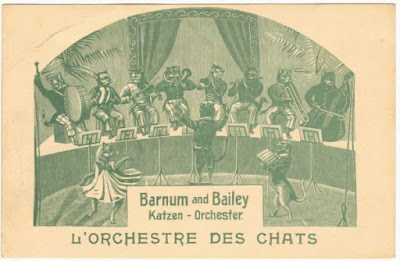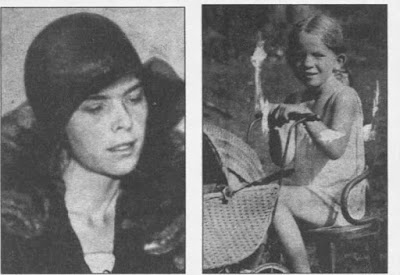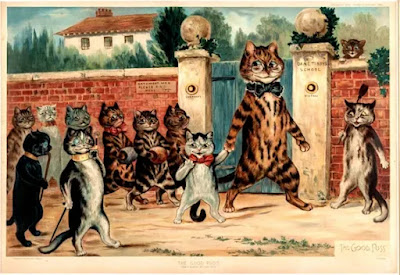This tale of an unusual haunting appeared in the July 1896 issue of “Borderland” under the title “A Haunted Man, A Strange True Story of the Far North-West.”
Our lot has been cast for some years in the interior of California--not Bret Harte's California, where miners camp in the pine woods of the Sierras--but that hot country far to the south, on whose grey hillsides oranges ripen and green lines of vineyard vary the monotony of treeless plains. The broad level of our valley is protected from the wind by low encircling hills. Month after month the sunshine is unclouded--one wearies sometimes of the pale blue sky--and life seems changeless as the weather. To Europeans the country is very still, very lonely, almost suggesting Matthew Arnold's "Grande Chartreuse," but the passing pageantry of the "distant road" is out of sight and the silence unbroken.The little town which gives its name to the great county once had a boom, who so has seen, which, according to Rudyard Kipling, may henceforth "talk with his enemies in the gate," so unique is the experience. One of its results was the erection of hotels on large tracts of land in the back country-as the interior is called-with a view to helping the sale thereof. Our quiet existence in one of these for the boom had passed- -was agreeably enlivened by the arrival of a sick friend--unseen for years. A former residence in the rigorous climate of that portion of British territory bordering on Alaska had begun to undermine his constitution, and, after retiring from a government position in Canada, health-seeking had become the object of his life. In hope of alleviation he had wandered far and wide, maintaining with indomitable energy the struggle against mortal disease, and returning to California as a last resort. But the odds were against him. The battle was fought out in the end of 1890--beneath the sands of Arizona he waits the resurrection.
We had known of his years of hardship and adventure in the service of the Hudson's Bay Company. But, in these last months of his life he related to us an experience so inexplicable that the late Professor Spencer Baird, of the Smithsonian Institute, Washington, took it down from his lips, intending to publish it. The Professor died--and the story, though set up in type, remained untold--then, and as far as is known ever since. Should it now see the light, will his two relatives, if surviving, pardon its publication without their consent.
Belonging to a Scotch Canadian family, our friend possessed the characteristics of his race. Conscientious, kind, reliable, he added to a horror of exaggeration a deficiency in imagination. A strict churchman free from credulity, his mental attitude toward the supernatural resembled that of the late Sir David Brewster, concerning whom his daughter wrote, "He saw ghosts, but never believed in them." That the story rests solely upon his evidence is its weak point. Nevertheless, being curious, I give it for what it is worth. It covers four years of his life on the Alaskan frontier, prior to 1867, when the Russian province became American territory. The date is only approximate, but I believe it immediately preceded that above mentioned.
The Hudson's Bay Company had an important trading station on the great Yukon River, of which our friend, whom I will call Graham, was in charge, assisted by a partner.
This settlement, known as Fort Yukon, was a rendezvous for the hunters and trappers of the surrounding region-natives, half-breeds, whites-who brought with them furs for sale or in exchange for stores of various kinds. To obtain skins, Graham and his partner would also organize hunting expeditions into the forests of some days' or week's duration. One evening, while sitting at supper, his partner being absent with the hunters, he received information from some of his men that the large store adjoining the house was haunted. The Indians, who always turned to him in perplexity, begged him to come and lay the ghost. Armed with stick and lantern he proceeded to investigate the cause of the disturbance. The store had been closed for the night, a careful search revealed nothing, and Graham extinguished his light. An unglazed window in the wall behind the counter opened upon a shed where skins were stored, it being the custom at busy times to throw furs received in payment through this opening to be afterwards sorted. As Graham deposited his lantern two shining eyes glared at him from this window. He swung his stick vigorously, eliciting a canine yell, and with the satisfaction of having laid the ghost--the natives alone doubting--he retired to his couch and slept the sleep of the just.
But not for long. In the small hours of the night he was awakened by the whines of his absent partner's dogs, who, in evident terror, had come to his room for protection. One of them, a little skye terrier, burrowing among his pillows to find a hiding place. The air was full of curious sound, as of a silken banner flapping in the breeze. He rose and lighted his lamp, nothing was visible, the night still and windless. Closely followed by the dogs, he crossed the passage to his partner's room. The noise accompanied him, and was as loud there as in his own. He returned with the noise, and finding sleep impossible, rolled himself in his blankets in a corner where the flapping sound seemed a trifle less pronounced. Towards morning it ceased. This troubled night proved to be the commencement of the period spoken of, during which Graham, shrewd, sensible Scotchman that he was, became literally a haunted man. There were intervals of respite, the manifestations not being continuous. They took the orthodox form of knocks and rustlings, varied by the sound of carpenters' tools, sawing, planing, &c., going on to such an extent that the hearers would involuntarily look round for some result of the industry.
These sounds were not only "in the dead waste and middle of the night," but more frequently in broad and cheerful daylight, heard by all in Graham's company. According to old exorcists the Monday ghost is the most difficult to lay. "Graham's ghost” became a general acquaintance in the country; anyone might hear him who chanced to meet Graham while he was "walking." The Furies were not then more constant to Orestes than was to him this undesired companion. In the distances of the great North-West the poet's words were fulfilled to the letter. "Where'er he went, a thousand miles, It followed him." To select a few instances from many, Graham was enjoying a shooting and fishing excursion upon the Yukon with a clerical friend from Toronto. It was one of the ghosts' days, and as leading the way he paddled his canoe he became aware of vigorous hammering upon the narrow seat. His friend had previously expressed a wish to hear the unseen visitant, and when within hailing distance Graham shouted, "Here he is!" Arriving alongside, so interested was the clergyman in the repeated sound, that he proposed changing canoes. They did so; the ghost went with Graham. They changed canoes three times with the same result, to the disgust of the ghost's would-be acquaintance, who, if living, doubtless remembers the circumstance. On another occasion a party of eighteen persons from the Settlement, including Graham, started for a camping trip in the woods which skirt the great river. The first night after the tents were pitched upon its banks, a heavy fall of rain ensued, soaking everything, and Graham, who had fixed a waterproof awning to the largest boat, invited everyone to share its shelter. When all were comfortably settled, an inquirer incautiously asked the ghost's whereabouts. "Oh, he's not here,' ," said Graham, "we've left him at home." Immediately, as if in response to the statement, three tremendous blows were struck upon the mast, just above Graham's head. There was no one in that part of the boat at the moment, and the lights were in such a position that sleight of hand would have been detected. The company scattered back to their damp resting places, leaving Graham to the sole enjoyment of shelter and ghost then, a new arrival in Fort Yukon. He was considerate enough not to trouble the party farther, confining his few attentions for the remainder of the trip to his usual victim.
Of the ghost's appearances there are but few recorded instances. Graham's exact mind attached little credence to them ascribing the majority to the imagination or nervousness of impressionable minds. One visible manifestation was, however, attended by such disastrous consequences that it is worthy of note. Graham was on a hunting expedition of some days' journey in the interior, when a messenger arrived from Fort Yukon urgently requesting his immediate return, for Louis, an intelligent half-breed, who lived in the forest near the Fort, was mysteriously dying. As Graham had called at Louis's some two days previously, and left him in perfect health, he was surprised at the news, and went back without delay. He found poor Louis in a sad condition suffering paroxysms of terror which the kindly priest with prayers and exorcisms strove to allay. Louis became somewhat calmer, and told Graham the cause of his fear, seemingly insufficient thus to unhinge his mind. When Graham left his house he left his ghost behind him, probably for the first time in those haunted years. Louis, busy in the room, was suddenly aware of another presence, and saw a young man sitting beside his fireplace. His face was thoughtful, his dress, the style prevailing in the earlier part of this century, even to the voluminous neckcloth. The apparition was not more terrible than was Dr. Jessop's studious ghost in the library of the Norfolk country house. But Louis felt that it was supernatural. His blood froze as the ghost turned to him and "addressed itself to motion." At that moment his wife opened the door. The vision vanished, "passed," he said, "as though across a mirror," and he fell fainting upon the floor. Graham had not spoken of his ghost to Louis, so that apart from his presence there was nothing especially suggesting it to his thoughts. Nevertheless, it proved the beginning of sorrows to the poor fellow, who, shortly afterwards, died insane.
Things had been quiet for some time in the ghostly line. Graham was anxious to visit Toronto, and fearing that the company of an uninvited spirit might render him an unwelcome guest, flattered himself that his ghost was elsewhere. He was rash enough to express this belief in talking with friends one day, and was immediately startled by feeling the grip of a hand upon his shoulder lasting nearly a minute. His coat was off at the time, and he described the grasp felt through his shirt as a firm, soft one, so unlike the horny hand which he had associated with the frequent use of carpenter's tools, that poor Graham wondered how many there were of them. Needless to state, he postponed his journey.
When Epworth Rectory was burned down its tenant at will, named Jeffreys by the Wesleys, appears to have perished in the flames, and the lively Emilia, who chased him down the long passages, "desiring nothing better," to quote John's letters, found on the rebuilding of the house that her occupation was gone. But Graham's ghost--a pity he was nameless--had more vitality. The house and store were burned and somewhat differently rebuilt. A large chamber with wide open fireplace served in winter as a bedroom for Graham and his partner. Their beds were each in a recess on either side of the projecting chimney, so that neither could see the other. One cold morning Graham was awakened by the noise of ashes being raked together, and the arrangement of fuel and striking of flint and steel to obtain a light. Supposing it to be his partner, who had gone to rest feeling unwell, Graham told him not to trouble himself, but if he required a fire, to call one of the men to light it. There was no answer, the striking continued. Graham rose and looked; his partner was asleep, and the grey ashes on the hearth lay undisturbed. The spiritual visitant henceforth frequently diversified his carpentering operations by such attentions to the fireplace, and was as busy in the new house as in the old.
On rare occasions the ghost spoke. Graham never distinguished anything articulate, nor did he encourage its conversation. Others asserted that they understood his meaning. Once with apparent reason. Unfortunately, I cannot describe its voice. The following incident is especially incredible. Were it not for the veracity of the witness, who solemnly averred he saw it, not once, but often, it would not be included in this narrative. In very severe weather, Graham's foreman, with one or two others, would sleep on the floor of the partner's room, as near as possible to the great fireplace, each wrapped in his blankets. The ghost now developed a new and playful habit. At times, an unseen force would actually hold the blankets down on either side of a sleeper's head, effectually waking and almost suffocating him. Graham assured me that he had frequently seen one man or another, for all were alike favoured, struggling violently to free himself from the invisible incubus, which fortunately made itself felt only for a few moments. The phenomenon generally occurred in the early morning, but, though the ghost struck him on various occasions, Graham was not subjected to this unprovoked assault. Eventually it became more partial in the matter to another Scotchman, MacDonald by name, a recent arrival at the Fort and Graham's new foreman. One morning he saw him wrestling longer than usual with the mysterious foe, and when he emerged from his blankets, scared and panting, he exclaimed that the ghost had spoken, informing him that having haunted Graham for years, and made nothing of him, he had concluded to transfer his attentions elsewhere. Hearing nothing himself Graham was as incredulous as ever. Yet, singularly enough, from that time the inexplicable persecution ceased, though why MacDonald rather than himself should be the chosen medium of communication was unknown. Not a suggestion of carpentering, nor a knock remained. The sleepers henceforth lay at peace upon the floor, the ghost went as he came, and, like the ancient king, "departed without being desired."
Four years had passed since the frightened dogs cowered in Graham's room, and his journey to Toronto had not yet been taken. Waiting awhile to assure himself of his freedom, he left the Hudson's Bay Territory, never to return. Nothing more was heard of the unseen presence by anyone; nothing came of it, an unsatisfactory ending to a ghost story. Long afterwards, when worn in spirit with years of suffering, the memory of his former experience cast a shadow upon his failing life. Would the ghost come back to vex him, taking advantage of his weakness? It did not trouble him, however, and the quiet of his death-bed under the odd sky of the South was unbroken.



















